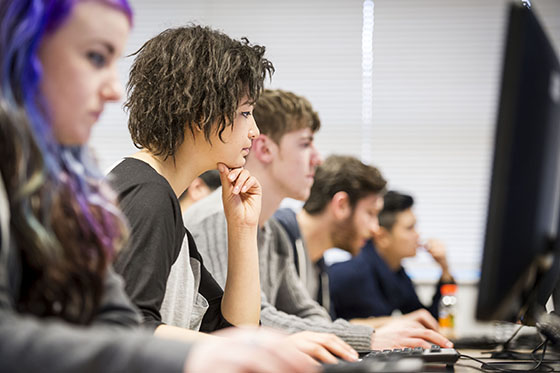Academic case studies
Take a look at some of these case studies for how co-creation can work in an academic setting:

Business and Management
“Empowering students to co-create aspects of their student experiences at programme level beyond formal classes and assessments…engages them and enhances their experiences as they become part of a vibrant community of same subject area learners learning from, and supporting, each other.
For programme leaders, this type of co creation can certainly be a means of interacting, engaging, and building a relationship with students by offering them a supportive, positive, understanding forum and space, in which they have regular opportunities to talk about their wider experiences on programmes.”
The Business and Management Programme is one of the largest and most diverse ones across DMU with learners from a wide range of backgrounds and circumstances. This has resulted in a lack of cohesiveness, programme identity and distinctiveness, and a sense of isolation for some students in their journey through the course.
The challenge was to find ways of instilling cohort identity and programme distinctiveness, and get a better sense of the challenges and issues faced by students, and in the process develop a better learning community and student experience.
A group of student volunteers were formed into an organising committee and came up with ideas on what the programme could do.
The final proposal was to adopt a charity as a programme and organise a full day of fundraising activities. The event would also serve as an opportunity for the students to utilise and practice a number of skills they would need after graduation (leadership, marketing, time management etc.)
As the task ran for a number of weeks, most of the students felt empowered as they were actively involved in making decisions about something impacting on their programme. This lead to positive feelings amongst them (and the wider student group) about their learning community.
Assessment literacy - Demystifying the guidelines
“Students need recognition and positive feedback when helping us with curriculum innovations to enthuse them to help with further innovations.”
An innovation introduced into the midwifery curriculum demonstrates one example of the potential of co-creation to enhance clarity on assessments and influence student success rates.
Despite already offering detailed information within module guides to pass assessments, repeated questions were being raised. So, students were encouraged to compile their own specific questions about individual assessments. Resources in the form of a ‘live’ Q&A session between students and staff were then created which can be referred to in the future and give students a greater choice and variety of resources.
This approach is now being undertaken for each type of assessment and so additionally supporting already busy mentors. It also means that tutorial support time can be more focussed on the students’ draft work rather than asking questions about the assessment.
Student Researchers in Criminology
“Co-creation really does enable you to see through the eyes of others in a most informative and helpful way.”
Students on the BA Criminology programme were invited to apply for a ‘research student role’ as part of a team project which focused on student assessment.
Previous research within the division, which was (in part) supported by student feedback, identified that there might be improvements that could be made to ensure that students felt more at ease with assessments.
In order to develop and better understand the difficulties that students faced, funding was obtained to support a co-creation project which would recruit and train student researchers to undertake and complete the task.
It was felt that this would provide an opportunity for students to independently develop professional skills in relation to future applications and interviews for employment but also enable them to practice skills in research.
Student Researchers and Academic staff worked very closely throughout the project to ensure that the research was fit for purpose- however- the research group was self-managed and in feedback sessions with staff, as the research progressed, students were able to reflect academically on their roles
A number of the recommendations from this project have made their way into the Criminology programme.
Apart from a more proactive focus on staff student communication these include:
- A more diverse menu of assessment topics and methods within the module portfolio.
- The development of a number of co-creation final year dissertation project opportunities between students and academic staff. These include projects sponsored by external agencies (Domestic Abuse), with university-based organisations (Mandala project) and media organisations (NARPO study).
- The broader adoption of Rubric making of student work
You Couldn’t Make It Up
“Student engagement was enhanced with students taking pride in the teaching and learning resources that they developed for the benefit of students in a different discipline”
FdA Artistic Make-Up and Special Effects (AMSE) students on a DMU programme delivered at Leicester College developed silicon based realistic prosthetic injuries as part of their assessment. These prosthetics were then utilised as teaching and learning resources for DMU’s Forensic Science modules.
Anatomy teaching tools are widely available but largely only represent the human body in good health. Undergraduate students on a Forensic Investigation module at DMU need to learn how to recognise injuries and understand how they have been inflicted or occurred. Such specialist knowledge is only available through a limited number of websites.
The prosthetics were produced by Leicester College students from remits written by DMU Forensic Science students who volunteered to attend focus groups. The ideas that were most useful for teaching and learning for both Leicester College and DMU students were selected collaboratively by staff.
The resources developed have enhanced realism in both outreach and teaching and learning activities. It also really engaged and motivated the students.